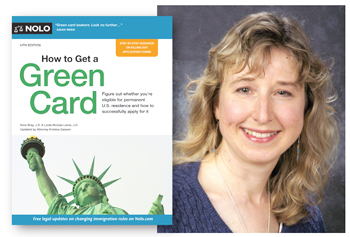Ilona Bray: Coming to America | Q&A
Ilona Bray, coauthor of How To Get a Green Card, offers a guide to help immigrants navigate the system.
 Ilona Bray, coauthor of How To Get a Green Card, 14th ed. (NOLO, Jul. 2020), offers a guide to help immigrants navigate the system.
Ilona Bray, coauthor of How To Get a Green Card, 14th ed. (NOLO, Jul. 2020), offers a guide to help immigrants navigate the system.
LJ: What is a green card?
Ilona Bray: A green card shows that its holder is a lawful permanent resident of the United States. Green card holders can stay in the U.S. for as long as they wish, assuming they don’t commit crimes or do something else that puts them at risk of being deported. They can usually apply for U.S. citizenship within five years.
How easy is it to obtain a green card without a lawyer?
That’s a tricky question. Someone who can afford a qualified, experienced attorney would be wise to hire one. But many people feel the legal fees will be out of their range. Others are preyed upon by fake attorneys who sometimes bill themselves as notarios, a term that connotes a high professional standing in some Spanish-speaking countries. Getting help from an unqualified or sham attorney can permanently destroy someone’s chances at immigrating.
How can people stay hopeful in the face of bureaucracy?
I try to be open about the red tape, to reduce people’s surprise when they encounter months-long governmental delays, ridiculous requests, or other frustrations. The good news is that applications for immigration benefits aren’t usually denied outright unless applicants are clearly ineligible—
people have a chance to supply whatever documents, evidence, or fees the U.S. government believes to be missing from the application. The bad news is that the government is sometimes wrong about what’s missing, or has lost all or part of one’s file or fee payments. Applicants sometimes have to send the same thing in twice or more—and sometimes accompany it with a sternly worded letter from an attorney.
What are some misconceptions about immigration?
Who an “undocumented immigrant” is. The lines aren’t as clear as one might think. Someone who arrives as a student from a country that’s dangerous to return to, and who stays past the expiration date of their visa and then spends a month getting an application for asylum together, is technically undocumented during that month and could be deported. But as soon as that asylum application is mailed in and a decision is pending, the person has a right to be in the United States. Eventually, they might be approved for a green card.
The law recognizes many situations in which being undocumented is not a permanent strike against someone—or in which even if they were arrested, an immigration judge might recognize that they have grounds on which to stay, and grant them residency.
Another big misconception is that marriage to a U.S. citizen turns one into a green card holder, or even a citizen, almost automatically. Not only is it a long process, but it can be easily derailed if the immigrant entered the United States without permission or broke laws.
How will your newest edition reflect The Trump administration’s actions?
Although the Trump administration doesn’t have the power to unilaterally change U.S. immigration law, between Trump’s executive orders and Attorney General William Barr’s issuance of opinions in place of Board of Immigration Appeals rulings, it’s getting as close as it can.
One of the biggest issues is simply government delays. Reallocation of government resources to border enforcement and an increased insistence on conducting personal interviews even in straightforward employment-based cases have resulted in months’ or years’ long backlogs.
The Deferred Action for Childhood Arrivals policy for foreign-born people who were brought to the United States as children also remains a question mark—I don’t know yet what the new edition will say about it, as we await action by both the federal courts and Congress.
What advice do you have for public librarians assisting immigrants?
Librarians should balance encouragement with caution. Immigration law can be treacherous. Every so often, Congress holds hearings about the complexities and comes away with exclamations about how it’s even more tangled than the U.S. Tax Code. Educating oneself ahead of time about what to expect, instead of relying solely on an attorney or a well-meaning friend, is an excellent idea.
This is critical: An out-of-date book on immigration law is worse than no book at all. Seriously, please throw out superseded editions.
ALREADY A SUBSCRIBER? LOG IN
We are currently offering this content for free. Sign up now to activate your personal profile, where you can save articles for future viewing









Add Comment :-
Comment Policy:
Comment should not be empty !!!